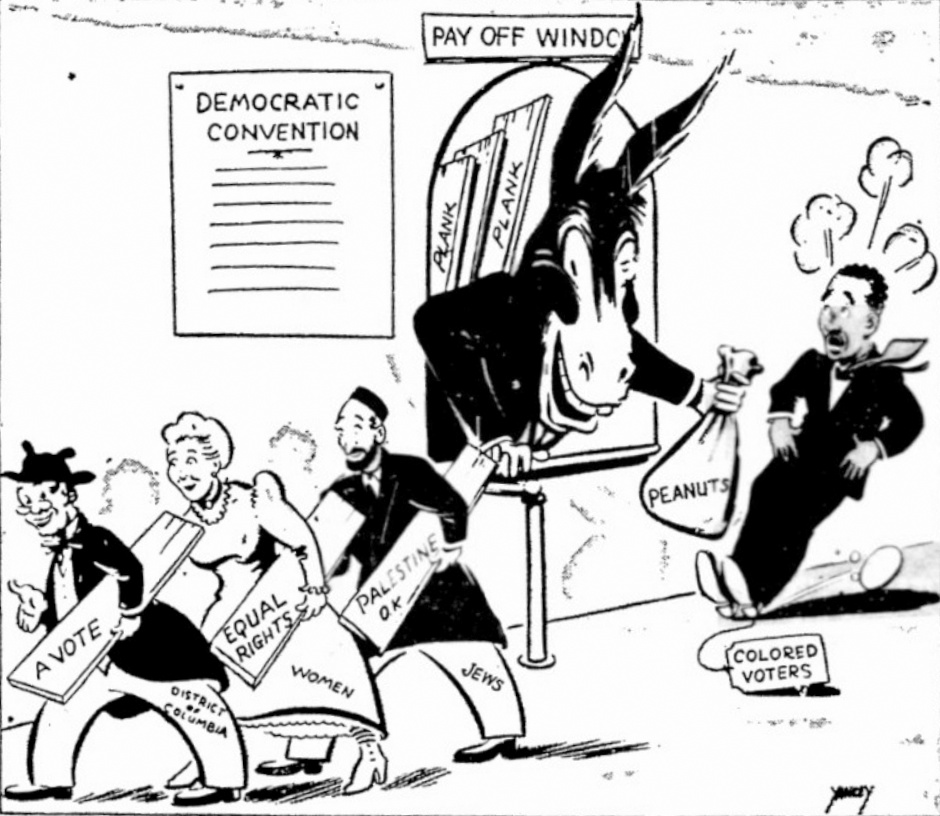The Pittsburgh Press (July 23, 1944)

Editorial: The picking of Truman
Candidate Roosevelt said:
I shall not campaign in the usual sense for the office. In these days of tragic sorrow, I do not consider it fitting. Besides, in these days of global warfare, I shall not be able to find the time.
Also, “I do not wish to appear in any way as dictating to the convention.”
But the record as developed in the Democratic Convention does not support Candidate Roosevelt’s words.
He arranged a military inspection trip, which conveniently took him through Chicago for a secret conference with convention leaders, and then proceeded to run the meeting by remote control.
The platform and vice-presidential choice were his own.
Before the convention, Mr. Roosevelt told his loyal friend and Vice President, Henry Wallace, to run – for the latter was unwilling to do so without his support. Mr. Wallace ran – and was killed off by a letter which damned him with faint praise.
Before the convention, Mr. Roosevelt also told his loyal friend and “deputy” president, Jimmy Byrnes, to run – and then nodded for his withdrawal after the convention was in session.
Backers of Mr. Wallace and Mr. Byrnes felt they had been double-crossed, and said so.
Another presidential letter was flashed approving Justice Douglas – but by that time the confused delegates looked on it as perhaps just a trick to divide the Wallace forces.
Another vice-presidential candidate, Senator Barkley, has also been given presidential approval in an open race – but also got the gate.
These various vice-presidential candidates, it developed, had all been mere scenery. Mr. Roosevelt’s handpicked national chairman, Hannegan, and the big-city bosses – Kelly of Chicago, Flynn of New York and Hague of New Jersey – had been told that the real choice was Senator Truman, and they put him over very neatly.
The record is that Mr. Roosevelt did dictate to the convention and did play partisan politics – despite his high-sounding assurances.
Regardless of the political hocus-pocus which led to Senator Truman’s nomination, he was the best available running mate.
On a statesmanship basis, Mr. Truman is “a first-rate second-rate man,” rather than a top flight potential successor in the White House – and, being an honest and modest person, he knows it. But he is excellent for the Roosevelt purpose, which is to pacify as many of the warring Democratic factions as possible.
Mr. Truman’s single asset was apparent but not real – his left-wing CIO support was in the fourth-term bag anyway. So, the same presidential hand that raised up the unpolitical Wallace in the unwilling convention of 1940, struck him down in 1944 because he was no longer useful.
But Mr. Truman is almost a complete campaign asset. Although originally sent to the Senate by the notorious Boss Pendergast, he has established an excellent Senate record. He has many political assets which will help pacify the smarting factions of a divided party.
Mr. Truman’s chief appeal to the public is his record as chairman of the Senate committee uncovering war contract frauds – “honesty in government,” and “the taxpayers and soldiers’ friend.” He has a good World War I record. He is not too old.
As an “average man,” he may be a campaign relief to many ordinary Democrats who are fed up with the unfailing cleverness and superior charm of the indispensable man. Also, Mr. Truman has no potent political enemies.
Maybe the humble but well-liked Truman can get more support for the Commander-in-Chief from his own political general staff and party field commanders, which he needs. Maybe that is the main reason that the best politician in the business – unless Mr. Dewey licks him – ditched half a dozen of his loyal friends in favor of Mr. Truman, who was not his friend and did not aspire to be Vice President or President.
